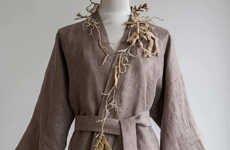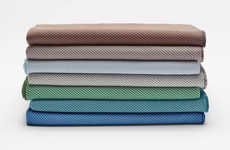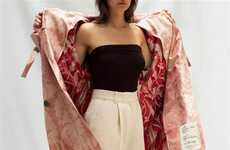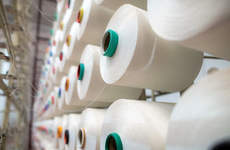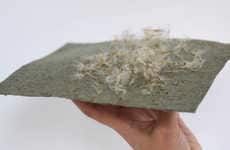
Siizu's SeaWool Fabric is Made from Recycled Oyster Shells
Grace Mahas — November 22, 2019 — Eco
References: siizu
Siizu's revolutionary SeaWool Fabric was developed as an alternative, eco-friendly textile that is sourced from an unlikely item in order to offer consumers a stylish fashion product. Made from sustainably sourced recycled oyster shells, SeaWool comes as a new way to produce a soft wool-alternative.
To create the SeaWool Fabric, Siizu worked with a specialized fabric supplier in Taiwan who sourced the oyster shells are from the food industry. The upcycled oyster shells are mixed with recycled plastic bottles and ground into a fine powder. This unique textile provides a number of benefits including being naturally anti-odor and providing insulation to stay warm in cold weather.
SeaWool Fabric is part of a growing number of initiatives launched to fight fast-fashion and help to change perceptions of upcycled fashions.
To create the SeaWool Fabric, Siizu worked with a specialized fabric supplier in Taiwan who sourced the oyster shells are from the food industry. The upcycled oyster shells are mixed with recycled plastic bottles and ground into a fine powder. This unique textile provides a number of benefits including being naturally anti-odor and providing insulation to stay warm in cold weather.
SeaWool Fabric is part of a growing number of initiatives launched to fight fast-fashion and help to change perceptions of upcycled fashions.
Trend Themes
1. Eco-friendly Textiles - Creating textiles from unconventional materials like oyster shells presents a disruptive innovation opportunity for sustainable fashion brands.
2. Upcycled Fashion - The upcycled fashion trend offers an opportunity for brands to differentiate themselves by incorporating unique and eco-friendly materials.
3. Alternative Wool - Developing wool alternatives like SeaWool fabric provides an opportunity to cater to consumers looking for cruelty-free and sustainable fashion options.
Industry Implications
1. Fashion - The fashion industry can embrace the use of upcycled materials like oyster shells to create innovative and sustainable fashion products.
2. Textile - The textile industry can explore the development of new materials, such as SeaWool fabric, to meet the demand for sustainable and eco-friendly textiles.
3. Sustainability - The sustainability industry can promote the adoption of upcycled fashion and encourage the use of unconventional materials in the production of textiles.
5.2
Score
Popularity
Activity
Freshness

